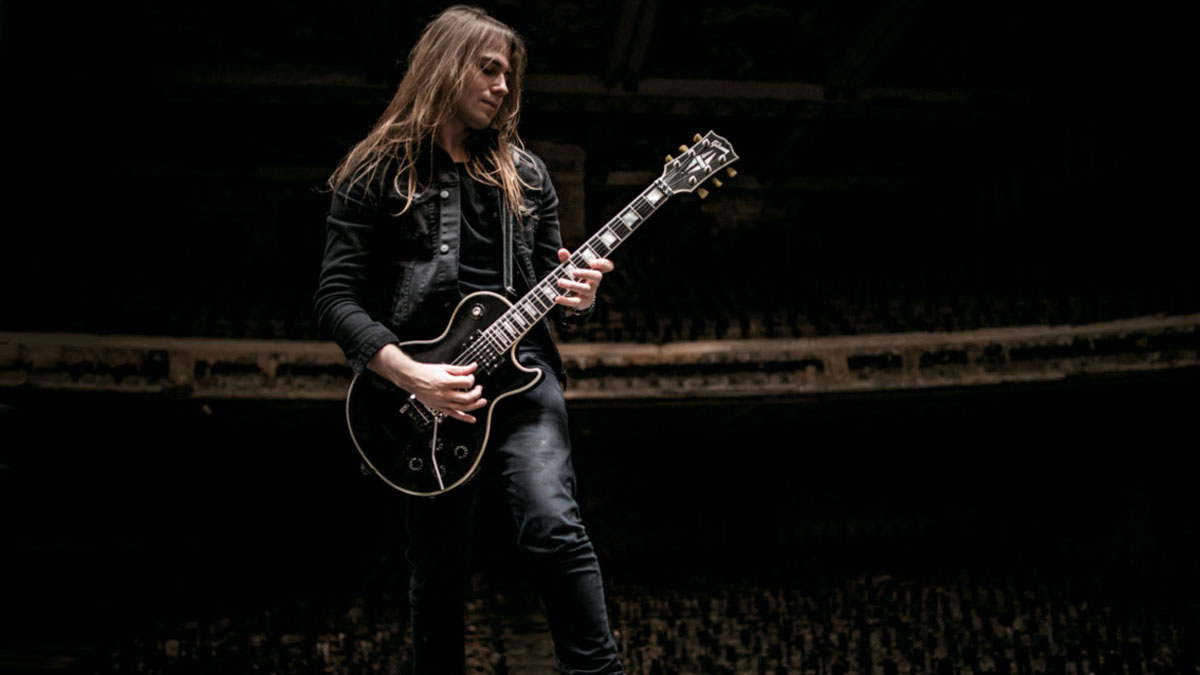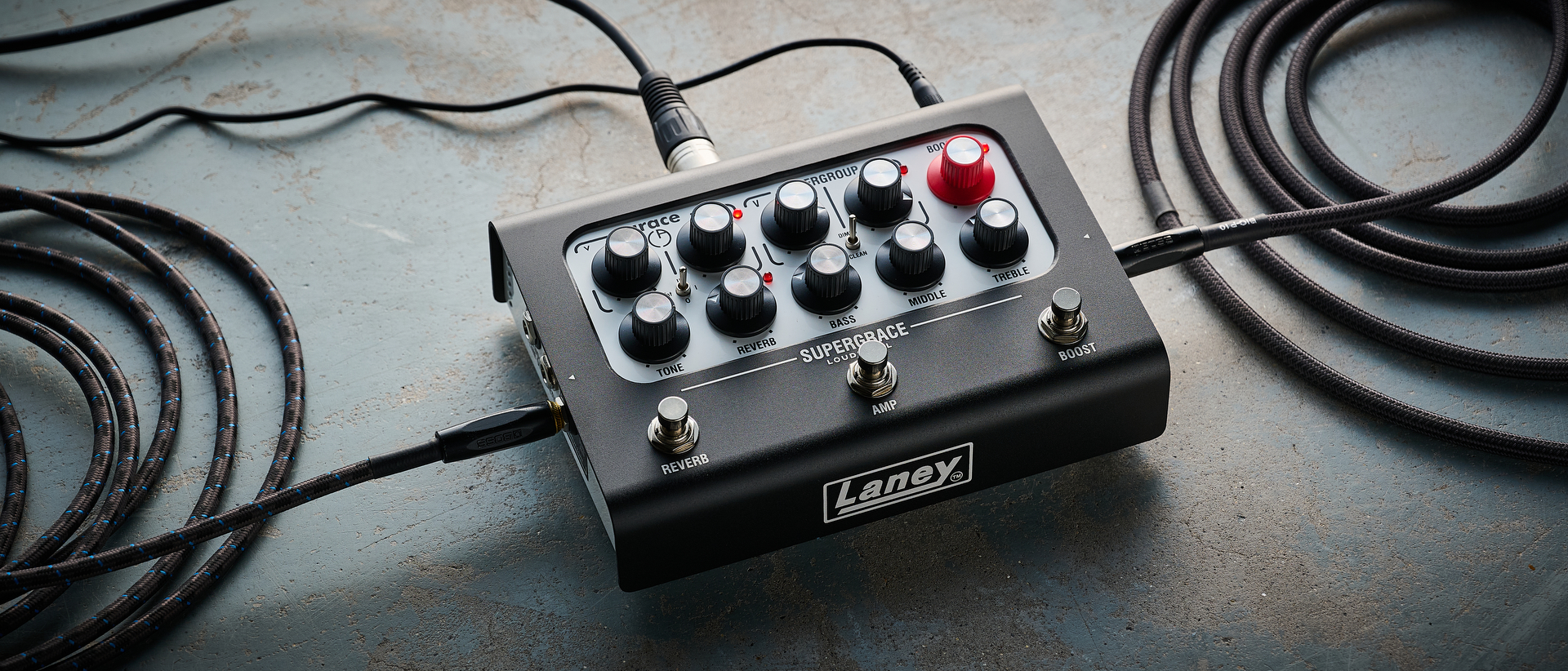Sammy Boller: ”If you go to take a solo and you’re thinking about theory, you’re immediately not playing from the heart”
The woodshedding virtuoso – whose GW lessons have melted a mind or two – reveals why 2020 is the year of guitar instrumentals

All the latest guitar news, interviews, lessons, reviews, deals and more, direct to your inbox!
You are now subscribed
Your newsletter sign-up was successful
Among the new generation of instrumental guitarists, there are polyrhythmic proggers aplenty, a legion of djenters doling out extended-scale bludgeonings – and even a fistful of notable roots rockers making interesting guitar records without the need for any singing.
And then there’s Detroit’s Sammy Boller, a young player who has studied and embraced the fundamentals of instrumental guitar rock as defined by the greats of the '80s and infused the form with a flare for the unexpected.
With his debut solo album, Kingdom Of The Sun, Boller has issued an absolutely stunning first statement as a trans-generational instrumentalist whose music won’t just inspire you to grab your guitar and hit the woodshed – its melodies will be bouncing around your head long after you’ve unplugged.
The most exciting thing about music for me is a search for the perfect melody. Once I get an initial idea for one, I’ll just start playing
While Boller’s songcraft and astounding melodic sensibilities are undeniably the bedrock of Kingdom Of The Sun, fans of fretboard histrionics will be delighted by the Joe Satriani-co-signed and former Citizen Zero guitarist’s expert shred chops and deft use of tapping techniques to build multi-part passages that recall Stanley Jordan and Eddie Van Halen’s work in equal parts, but with a uniquely Eastern harmonic twist (Check out Cloak of Light for the record’s shining example).
GW spoke with Boller about his meditative approach to penning universally catchy guitar instrumentals, how he avoids letting technical prowess get in the way of his songwriting, his unexpected singer/songwriter influences and how Instagram has changed the game for guitar culture in 2020.
Kingdom Of The Sun is full of really memorable melodies, which I think is one of the toughest things for an instrumental guitar player to do. Can you tell us about your approach to writing melodies that stick?
”The most exciting thing about music for me is a search for the perfect melody. Once I get an initial idea for one, I’ll just start playing, and the trick is I won’t stop until I’ve spent at least a half an hour with no pauses in my playing.
All the latest guitar news, interviews, lessons, reviews, deals and more, direct to your inbox!
”If you do that for long enough, it becomes like you’re watching yourself play, and a good melody becomes quickly apparent when you’re a bit outside of your playing. I have sort of an innate sense for melodies where I can tell if something’s just a little bit off, and I won’t stop until a melody is all the way there.
I always try to play from the deepest part of my heart and I know that’s kind of a cliche, but when it comes to melodies, it works!
”It’s really just about doing it fluidly until it’s where it should be. Music should be a really visceral, emotional thing and when you’re thinking too much about what you’re doing, it’s not really from your heart.
”I always try to play from the deepest part of my heart and I know that’s kind of a cliche, but when it comes to melodies, it works! It’s definitely a meditative thing. Music, spirituality and love are all the same thing.”
A big part of your sound and this record is your melodic use of two-handed tapping. How did you develop that technique and how did it first become such a big part of your songwriting?
”I’d been into the tapping thing since I was little from being a big Van Halen and Randy Rhoads fan. I’d been on the road for almost a year and a half straight with my old band and it was just grueling.
I feel like I’ve only just started to scratch the surface and like there’s a lot further to go with tapping – especially with building songs out of it
”At that point I was pretty burnt out on everything I was doing on guitar, so I started messing around with the melodic/multipart tapping stuff just for fun. I liked the way it sounded and it was refreshing after that tour to have a new style to work with.
”I feel like I’ve only just started to scratch the surface and like there’s a lot further to go with it – especially with building songs out of it. It’s cool to be able to play a rhythm part, a bass part and a lead melody all at once.”
You mentioned Van Halen and Randy Rhoads. Who else inspired you when writing Kingdom Of The Sun?
”I grew up with and love instrumental guitar music. As far as those albums go, I love the first Racer X record and Paul Gilbert’s playing, and I obviously love Joe Satriani; he’s a big influence influence because he’s very much a melody-oriented player and has so many wonderful songs, beyond just being a talented shredder.
”I also listen to music that is far-removed from instrumental stuff. I set out to make a record that non-guitarists could enjoy, and while I love heavy and progressive music, you can’t be slammin’ away 24/7.
I obviously love Joe Satriani; he’s a big influence influence because he’s very much a melody-oriented player and has so many wonderful songs, beyond just being a talented shredder
”I love singer/songwriters like Julien Baker and Phoebe Bridgers; they did a project together (along with another songwriter named Lucy Dacus) called Boygenius, which I took a lot of inspiration from.
”There’s also a singer/songwriter named Ethan Gruska; he just released an album called En Garde. For me, these people write really deep and emotional songs, and that’s what I connect with as a music fan. It’s honest music that’s easy to connect with, and it’s a great time for that ethereal singer/songwriter kind of thing.
You’re an extremely technically proficient player, and a lot of technical players have a tendency to be predictable songwriters. How do you avoid letting your understanding of the “right” way to do things on a guitar hamper your creativity as a songwriter?
”Music theory is only something you need to use when there’s a sonic problem to solve. When you’re thinking too much about the music you’re making, you’re one step out of the moment. If you go to take a solo and you’re thinking about theory, you’re immediately not playing from the heart. Music theory has nothing to do with songwriting for me.
The ability to play a song all the way through with feeling is so much more important than understanding the song from a theoretical place.
”Theory and technique come secondary to emotion and trying to say something, and you have to learn to listen to yourself objectively, too. That’s just part of maturing as a musician and that takes time. The ability to play a song all the way through with feeling is so much more important than understanding the song from a theoretical place.”
You’re a Friedman amp user and often work as a clinician for them. What do you love about Friedman?
”Friedman makes the only amps I’ve found that have all the sounds and the features I need without sacrificing tone for the sake of features.
”A lot of my music goes from really clean to really heavy quickly and the Friedmans have that flexibility and the sounds are just better than anything else I’ve heard or tried. The distortion is incredibly powerful and huge and the cleans are really shimmery and pretty.
The clean sounds on the album are mostly the clean channel of the Friedman and some of the slightly broken up tones are a ’68 Marshall Plexi
”Most of the record is a BE-100 head through a Friedman 4x12 loaded two Celestion V-30s and two 25-watt Greenbacks. The clean sounds on the album are mostly the clean channel of the Friedman and some of the slightly broken up tones are a ’68 Marshall Plexi.
”We recorded the album at Rustbelt Studios in Detroit; they have an early Sixties Vox AC-30 that we used a bit. I’m not a plugin guy for amps; I totally understand they have their place, but I’m more old school and I really wanted us to sound like a band playing live together.”
Which guitars did you rely on for tracking the album?
”It’s mainly my Les Paul Custom, which is based on the Les Paul Axcess model and has a Floyd Rose, but is a one-off custom order that I got on eBay.
”I’ve made some modifications to it, like installing Motor City Pickups and a coil tap because I use a full bridge humbucker for distorted sounds, but I’ll use both pickups and have the neck humbucker tapped for clean sounds. Some of the rhythm parts were done on a custom eight-string guitar by a company called King Custom.”
I try to write something every day and I felt like I had to make this record. It was more for myself than anything.
What motivated you to make an instrumental guitar record?
”I try to write something every day and I felt like I had to make this record. It was more for myself than anything. Over the past 10 years the guitar has become more popular than ever – at least online. Every time I’m on social media, I discover another great player, and a lot of them are doing the instrumental thing.
I feel so grateful because even when I’m doing clinics with Friedman, people will come to the clinics just because they saw a clip of me on Instagram
”It might not be as prominent in pop culture, but when you look at how big the Instagram gear community is, there’s no denying that it’s wildly popular. Also, it’s a different world than 30 years ago and you don’t have to do just one thing as a musician, and as a guitar player that’s a really cool thing to consider.
”I find that a lot with different producers; maybe they grew up playing heavy metal or are secret shredders, but they end up making pop records, and that’s not only because you have so many different outlets these days. You kind of have to take advantage of how many outlets there are and be open-minded if you want to work.”
You’ve developed a strong following on Instagram; I’ve seen a lot of fans covering the first single from the new record. How has Instagram has affected your own growth as a player?
”That freaks me out, man! That people have learned my song – it’s such an incredible thing. My real dream as a musician is to serve others, and if you’ve liked a song I’ve written enough to learn it and make a part of your playing, that means the world to me.
”Instagram has been huge and I feel so grateful because even when I’m doing clinics with Friedman, people will come to the clinics just because they saw a clip of me on Instagram. It’s just a great way to get yourself out there as a player and also a great place to discover new players. I’m constantly inspired by it all.”
- Sammy Boller's new album, Kingdom Of The Sun, is out now via Candy Rat.
